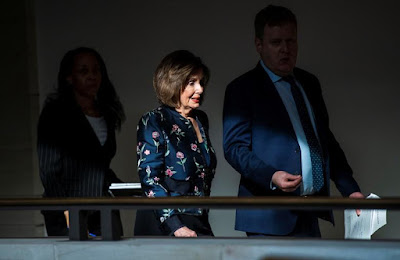The impeachment trial of Donald Trump, the 45th and incumbent president of the United States, began in the U.S. Senate on January 16, 2020, and is planned to conclude on February 5. It is a result of the impeachment of President Trump by the U.S. House of Representatives on December 18, 2019, following an inquiry stage that lasted from September to November 2019. The House passed two articles of impeachment, charging him with abuse of power and obstruction of Congress.
After a partisan standoff over trial terms, on January 21, the Republican majority voted down 11 amendments proposed by Democrats, which among other things, requested subpoena authority to introduce testimony from current and former White House officials, and Trump administration documents which were not provided to House investigators. The prosecution made its opening arguments between January 22–24, and the defense, a team of attorneys selected by Trump, made its arguments between January 25–28. This was followed by a period of questions and answers and debate. On January 31, a Senate majority of 51 Republican senators voted against allowing subpoenas to call witnesses or documents. The Senate plans to conclude the trial on February 5, 2020, with a vote on the verdict, which requires a two-thirds majority to convict the president. The penalty for conviction is the removal from office; a separate vote would be required for disqualification from holding office in the future.
Under the U.S. Constitution, the House has the sole power of impeachment (Article I, Section 2, Clause 5), and after that action has been taken, the Senate has the sole power to hold the trial for all impeachments (Article I, Section 3, Clause 6). Trump is the third U.S. president to face a Senate impeachment trial, after Andrew Johnson and Bill Clinton. After the emergence of Trump's phone call with Ukrainian president Volodymyr Zelensky, House leadership came to the conclusion that impeachment might be necessary, and began an inquiry. As this was happening, Senate Majority Leader Mitch McConnell was quietly planning a possible trial. On October 8, 2019, he led a meeting on the subject, advising the Republican Senators to craft their responses according to their own political needs. McConnell proposed two potential avenues: state opposition to the House process, or refuse to comment due to being potential jurors.
As the articles of impeachment moved to a vote before the full House and referral to the Senate for trial, Mitch McConnell met with White House Counsel Pat Cipollone and congressional liaison Eric Ueland, later stating, "Everything I do during this I'm coordinating with the White House counsel. There will be no difference between the president's position and our position as to how to handle this ... I'm going to take my cues from the president's lawyers." As part of the "total coordination", McConnell stated that the president's lawyers could decide if witnesses would be called for the trial. McConnell also said there was "no chance" the Senate would convict Trump and remove him from office, while declaring his wish that all Senate Republicans would acquit Trump of both articles of impeachment. On December 14, Judiciary Committee chairman Lindsey Graham stated, "I am trying to give a pretty clear signal I have made up my mind. I'm not trying to pretend to be a fair juror here ... I will do everything I can to make [the impeachment trial] die quickly." Three days later, McConnell stated, "I'm not an impartial juror. This is a political process. There is not anything judicial about it. Impeachment is a political decision." The Constitution mandates senators to take an impeachment oath, in which by Senate rules is stated, "I will do impartial justice according to the Constitution and laws, so help me God.
The White House has formally announced its Senate trial counsel as being led by White House Counsel Pat Cipollone and Jay Sekulow, alongside Ken Starr, Alan Dershowitz, Pam Bondi, Jane Raskin, Eric Herschmann, and Robert Ray. Additionally, Michael Purpura and Patrick Philbin will participate in the trial. On January 20, the White House named eight House Republicans to serve on Trump's defense team: Doug Collins, Mike Johnson, Jim Jordan, Debbie Lesko, Mark Meadows, John Ratcliffe, Elise Stefanik, and Lee Zeldin.
Closing arguments were given by the prosecution and defense teams on February 3. That day, Democratic senator Joe Manchin, who was undecided on the trial vote, proposed the Senate censure the president to prevent his behavior to go "unchecked by the Senate," though there appeared to be little support for it.[169] On February 5, the Senate plans to vote on whether or not to convict the president on the charges and evidence as they have been presented and debated upon. Under Article I, Section 3, Clause 6 of the Constitution, a two-thirds majority of the Senate (in this case, 67 if all members are present) is required to convict the president. This means at least 20 Republican senators would need to vote with all Democratic (and two independent) senators to convict Trump. Conviction for impeachment cannot be appealed or pardoned; the penalty is removal from office; a separate vote, by simple majority, would be required for disqualification from holding office in the future. If Trump is removed from office, Mike Pence will become president in accordance with the 25th Amendment.
Read Here
Read Here















0 Comments